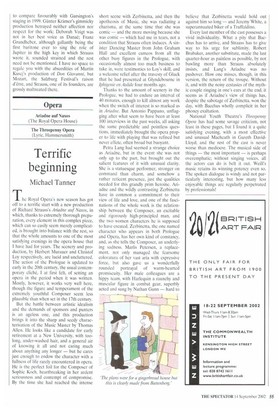Opera
Ariadne auf Naxos (The Royal Opera House) The Threepenny Opera (Lyric. Hammersmith)
Terrific beginning
Michael Tanner
The Royal Opera's new season has got off to a terrific start with a new production of Richard Strauss's Ariadne auf Naxos, in which, thanks to extremely thorough preparation, every element in this complex piece, which can so easily seem merely complicated, is brought into balance with the rest, so that the whole amounts to one of the most satisfying evenings in the opera house that I have had for years. The scenery and production, by Herbert Murauer and Christof Loy respectively, are lucid and uncluttered. The action of the Prologue is updated to early in the 20th century, the usual contemporary cliché, I at first felt, of setting an opera in the period when it was written. Mostly, however, it works very well here, though the figure and temperament of the extremely youthful Composer seem less plausible than when set in the 17th century.
But the battle between artistic idealism and the demands of sponsors and punters is an ageless one, and this production brings it into the sharp and seedy characterisation of the Music Master by Thomas Allen. He looks like a candidate for early retirement at a New University, with toolong, under-washed hair, and a general air of knowing it all and not caring much about anything any longer — but he cares just enough to endow the character with a fullness of life rarely encountered in opera. He is the perfect foil for the Composer of Sophie Koch, heartbreaking in her ardent seriousness and contempt of compromise. By the time she had reached the intense short scene with Zerbinetta, and then the apotheosis of Music, she was radiating a charisma, at the same time that she was comic — and the more moving because she was comic — which had me in tears, not a condition that Strauss often induces. A sinister Dancing Master from John Graham Hall and excellent cameos from all the other busy figures in the Prologue, with occasionally almost too much business to take in, were testimonies to Loy's skill, and a welcome relief after the travesty of Gluck that he had presented at Glyndebourne in lphigenie en Aulide four months ago.
Thanks to the amount of scenery in the Prologue, we had to endure an interval of 40 minutes, enough to kill almost any work when the switch of interest is so marked as in Ariadne. But Antonio Pappano, unflagging after what seem to have been at least 100 interviews in the past weeks, all asking the same predictable and pointless questions, immediately brought the opera proper to life with playing that was refined but never effete, often broad but buoyant.
Petra Lang had seemed a strange choice as Ariadne, but in the event she was not only up to the part, but brought out the salient features of it with unusual clarity. She is a statuesque performer, stronger on command than charm, and somehow a rather reticent presence, just the qualities needed for this grandly prim heroine. Ariadne and the wildly contrasting Zerbinetta have in common a commitment to their view of life and love, and one of the fascinations of the whole work is the relationship between the Composer, an excitable and rigorously high-principled man, and the two women characters he is supposed to have created. Zerbinetta, the one named character who appears in both Prologue and Opera, has her own kind of constancy, and, as she tells the Composer, an underlying sadness. Marlis Petersen, a replacement. not only managed the fearsome coloratura of her vast aria with expressive force, but also gave us a wonderfully rounded portrayal of warm-hearted promiscuity. Her male colleagues are a hippy team, with Harlequin a raunchy and muscular figure in combat gear, superbly acted and sung by Nathan Gunn — hard to believe that Zerbinetta would hold out against him so long — and Jeremy White, a superannuated biker of a Truffaldino.
Every last member of the cast possesses a vivid individuality. What a pity that Bacchus has to arrive, and Strauss has to give way to his urge for sublimity. Robert Brubaker, another substitute, made the last quarter-hour as painless as possible, by not bawling more than Strauss absolutely insists, and Lang's Ariadne was no pushover. How one misses, though, in this version, the return of the troupe. Without it, and with the noisy ecstasies of the mythic couple ringing in one's ears at the end, it seems as if Ariadne's view of things has, despite the sabotage of Zerbinetta, won the day, with Bacchus wholly complicit in her phoney exaltation.
National Youth Theatre's Threepenny Opera has had some savage criticism, not least in these pages, but I found it a quite satisfying evening, with a most effective and unusual Macheath in Gareth DavidLloyd; and the rest of the cast is never worse than mediocre. The musical side of things — the most important — is perhaps overemphatic; without singing voices, all the actors can do is belt it out. Weill's music retains its winning potency even so. The spoken dialogue is windy and not particularly interesting, but how many less enjoyable things are regularly perpetrated by professionals!










































































 Previous page
Previous page